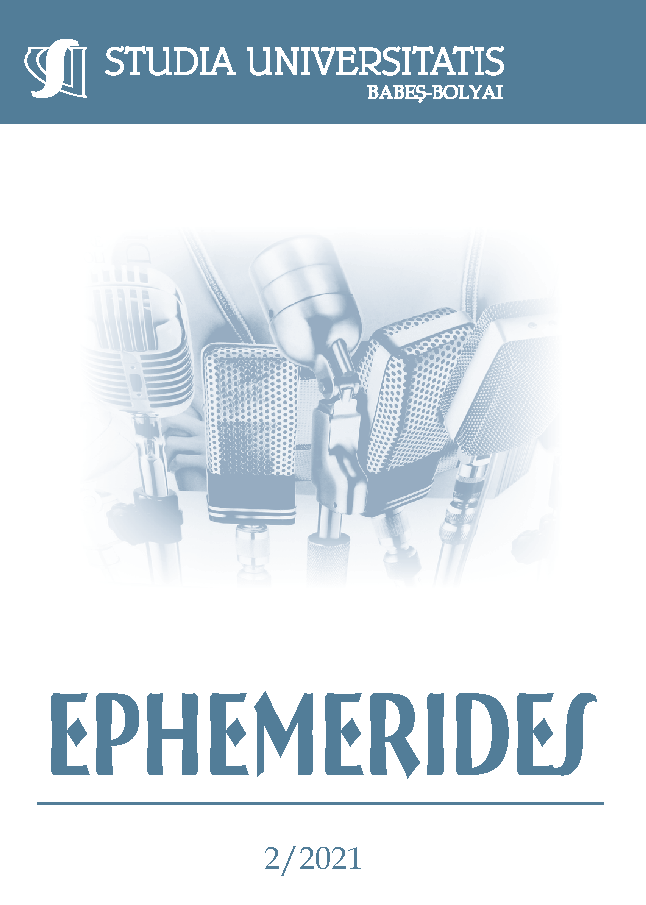SCHOOL-STAKEHOLDERS COMMUNICATION IN INNER AND OUTER CIRCLES DURING THE COVID-19 CRISIS
DOI:
https://doi.org/10.24193/subbeph.2021.2.02Keywords:
crisis, school communication, online communication, parent-school, communication in crisis.Abstract
I will discuss in this article the COVID-19 implications on school communication with stakeholders in the inner and outer circles. This article’s starting point is that especially in crisis times, school communication is the key to development, maintenance and preservation. The article will refer to the school climate in crisis and teacher-student-parent communication. The first part will deal with crisis implications on school communication, harming communication processes and its new characteristics, as a transition from face-to-face communication to online communication and its implications. The second part will deal with the school climate in crisis and how this climate changes communication. Research shows that the stress resulting from crisis causes many hardships in the school climate and influences the welfare and resilience of those who are involved in the school communication process: students, teaching staff and parents. The third and last part will present communication models taken by schools in crisis and demonstrate the technological and social characteristics and patterns of its implementation, which repeats for schools in crisis. The summary will present general recommendations for effective school communication in crisis when it is recommended to adjust each communicational action plan to the school’s unique characteristics.References
Balica, M. (2020). Why wellbeing matters during a time of crisis. Wales, UK: International Baccalaureate Organization.
Bojović, Ž., Bojović, P. D., Vujošević, D., & Šuh, J. (2020). Education in times of crisis: Rapid transition to distance learning. Computer Applications in Engineering Education, 28(6), 1467-1489.
Bonal, X., & González, S. (2020). The impact of lockdown on the learning gap: family and school divisions in times of crisis. International Review of Education, 66(5), 635-655.
Brancaccio-Taras, L., Mawn, M. V., Premo, J., & Ramachandran, R. (2021). Teaching in a time of crisis: editorial perspectives on adjusting STEM education to the “new normal” during the COVID-19 pandemic. Journal of microbiology & biology education, 22(1), ev22i1-2679.
Cahapay, M. B. (2021). Involvement of Parents in Remote Learning of Children amid COVID-19 Crisis in the Philippines: A Transcendental Phenomenology. International Journal of Sociology of Education.
Clausen, J. M., Bunte, B., & Robertson, E. T. (2020). Professional development to improve communication and reduce the homework gap in grades 7-12 during the COVID-19 transition to remote learning. Journal of Technology and Teacher Education, 28(2), 443-451.
Davis, F.D., Bagozzi, R. & Warshaw, P.R. (1989). User Acceptance of Computer Technology: A Comparison of Two Theoretical Models. Management Science, 35(8), 982-1003
Dryden-Peterson, S. (2020) Civic education and the education of refugees. Intercultural Education, 31(5), 592-606. DOI: 10.1080/14675986.2020.1794203
Economou, M., Madianos, L. E., Peppou, A., Patelakis, C. N.& Stefanis, C. N. (2013). Major depression in the era of economic crisis: A replication of a cross-sectional study across Greece. Journal of Affective Disorders, 145, 308–314.
Fisher, M., & Crawford, B. (2020). “From School of Crisis to Distinguished”. The Rural Educator, 41(1), 8-19.
Finn Church Aid. (2018). Improving Wellbeing Through Education – Integrating Community Based Psychosocial Support into Education in Emergencies. Available at: https://www.kirkonulkomaanapu.fi/wp-content/uploads/2018/10/ImprovingWellbeingThroughEducation_web.pdf
Grissom, J. A., & Condon, L. (2021). Leading schools and districts in times of crisis. Educational Researcher, 50(5), 315-324.
Hatzichristou, C., Lianos, P., & Lampropoulou. A. (2017) Cultural construction of promoting resilience and positive school climate during economic crisis in Greek schools. International Journal of School & Educational Psychology, 5(3), 192-206.
Kentikelenis, A., Karanikolos, M., Papanicolas, I., Basu, S., McKee, M., & Stuckler, D. (2011). Health effects of financial crisis: Omens of a Greek tragedy. Lancet, 78(9801), 1457–1458.
Mabeya, M. T. (2020). Distance learning during COVID-19 crisis: Primary and secondary school parents’ experiences in Kenya. East African Journal of Education Studies, 2(1), 173-186.
Ministry of Education (2020). COVID-19 guidelines. Available at https://www.education.go.ke/images/COVID-19_GUIDELINES.pdf
Müller, L. M., & Goldenberg, G. (2020). Education in times of crisis: The potential implications of school closures for teachers and students. A review of research evidence on school closures and international approaches to education during the COVID-19 pandemic. Chartered College of Teaching.
UNESCO. (2020). COVID-19 Impact on Education Data. COVID-19 Education Disruption and Response. Paris, France: United Nations Educational, Scientific and Cultural Organization.
Van Hal, G. (2015). The true cost of the economic crisis on psychological well-being: a review. Psychology Research and Behavior Management, 8, 17–25.
Downloads
Published
How to Cite
Issue
Section
License
Copyright (c) 2021 Studia Universitatis Babeș-Bolyai Ephemerides

This work is licensed under a Creative Commons Attribution-NonCommercial-NoDerivatives 4.0 International License.






